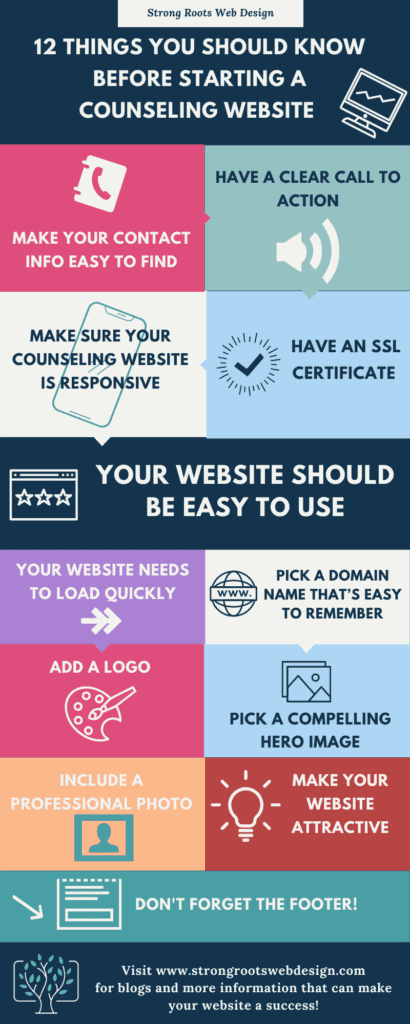
Boost Client Trust! Privacy-Compliant Designs for Therapists
Therapists and mental health professionals are realizing how important it is to have a good online presence in today’s digital world. Building trust with clients is really important, and one way to do that is by having a website that respects their privacy.
As therapists go online, it’s crucial to make a secure and comforting space for potential clients.
In this blog post, we’ll talk about why having a website that follows privacy rules is so important for therapists, and we’ll share some practical tips to make clients feel more at ease.

Table of Contents
How Important Are Privacy-Compliant Designs?
Making sure a therapist’s website follows privacy rules isn’t just about obeying the law—it’s about making a safe and trustworthy space for folks seeking help with their mental health. It’s clear that having strong privacy measures is really important in the online world.
When someone checks a therapist’s website, they want it to feel like a private and safe spot to talk about their mental health. Designs that respect privacy do more than just meet legal rules; they show a commitment to making clients feel sure and safe. Clients need to know that their private info will be handled with care, creating a space where they can openly share their thoughts and feelings.
Therapists need to be careful about keeping client info private. Having a design that follows privacy rules is a way to actively show that therapists care about their clients’ well-being and trust. It’s part of their responsibility to protect client info, making individuals feel safe and supported as they work on their mental health.
Making a therapist’s website design privacy-friendly isn’t just a legal thing but a thoughtful action to prioritize clients’ emotional and mental safety in a world that’s more connected online. Recognizing the importance of such designs helps therapists create an environment where people feel encouraged to seek help without worrying about their privacy.
The Role of Privacy in Therapeutic Relationships
Trust is super important in therapy. Clients need to know their info is safe and private. If your therapist website has privacy-friendly features, it shows you’re serious about keeping client info secure. This helps clients feel safe and trusting.
Key Features of Privacy-Compliant Therapist Website Design
When it comes to creating a privacy-compliant therapist website, simplicity and transparency are key. Let’s get into some essential features that can enhance the privacy and trustworthiness of your online platform.
Secure Communication Channels
Making sure your therapist website is private and secure is really important. One key thing is to use safe communication channels. This means using special messaging systems that keep everything confidential through encryption. It’s like putting a strong lock on the messages between you and your clients.
By doing this, clients can trust that their private information stays safe during therapy. Using encrypted messaging prevents unauthorized access and shows that you take privacy seriously. This not only follows the rules for mental health professionals but also creates a safe online space that makes clients feel confident and trusting in the therapy relationship.
When therapists focus on secure communication, they not only do their job well but also create a safe online space that makes clients feel confident and trusting in the therapy relationship.
User-Friendly Privacy Policies
Making privacy policies that are easy for people to understand is really important. Keep it simple and clear, so clients know what to expect with their data. Use straightforward language instead of complicated words to make it easy for everyone to get it.
Put these policies where people can easily find them on your website. This way, clients can check and understand how their data is handled. Making things simple and accessible not only shows you’re open but also helps clients feel comfortable. It’s all about creating a positive experience and building trust in the digital world.
Confidentiality Assurance
People who need therapy usually want to keep their personal stuff private, so it’s really important to make them feel secure.
Reassure your clients that their information is safe and private on your online platform. This helps them feel more confident and shows that you follow the rules to protect their data. Talk about the steps you take to secure their info on your website, in messages, and during online sessions.
Doing this not only alleviates their concerns but also demonstrates your commitment to privacy, making your online therapy service trusted and successful.
Making it clear that you take steps to keep things confidential is key to having a successful and trusted online therapy service.
Exploring Legal Compliance
It’s really important to follow the rules when making a therapist website. You need to understand and stick to the privacy laws that apply to your area.
This is a must-do part of having a website. When you know and follow the legal rules, it keeps your clients safe and shows that you’re doing things online in a good and responsible way.
By taking care of these legal things in your website design, you’re not just avoiding problems, but you’re also building a good name for yourself.
Making sure your online practices match the legal rules not only protects your clients but also makes you look trustworthy and responsible in the digital world.
GDPR Compliance
In Europe, it’s vital to follow the General Data Protection Regulation (GDPR) to keep client info safe on your therapist website. The GDPR, a set of rules for protecting data, sets a high standard in Europe. Make sure your website sticks to the GDPR rules and be clear about it.
This not only keeps your clients’ info safe but also shows that your practice cares a lot about privacy. Being honest about GDPR compliance helps build trust with possible clients, assuring them that their personal details are handled well.
Showing your practice follows GDPR not only meets legal needs but also shows your dedication to making a secure and reliable online place for people looking for therapeutic help.
HIPAA Compliance in the United States
For therapists in the U.S., following the Health Insurance Portability and Accountability Act (HIPAA) is really important. It’s a set of rules to keep patient info safe. This is a big deal because it shows clients that their privacy matters.
Being HIPAA compliant means therapists take their job seriously and are responsible.
It’s not just a legal thing but about making sure clients can trust their therapist to keep their personal info safe.
Especially in today’s digital world, therapists need to understand and follow these rules to make sure they’re doing their best for their clients.
Building Trust Through Transparent Practices
Beyond legal compliance, transparency is key to fostering trust with clients. Incorporate the following practices into your website design:
Client Testimonials and Success Stories
Putting client testimonials and success stories on your website is a great way to show the human side of your practice. It lets people see how you’ve helped others in a positive way. When you share these stories, it’s important to subtly tell visitors that you take privacy seriously. This reassures them that your practices are safe and professional.
Real stories of improvement and success help build a connection with potential clients. They can see the actual benefits of working with you.
By doing this, you build trust and make it easier for people to imagine their own positive journey with your support. Client testimonials are like real-life proof that your practice works, making you more trustworthy in the online world.
Secure Payment Processing
When arranging online payments for your therapy services, opt for well-known and reliable payment options like PayPal or Stripe. Choose methods with a proven track record for securing sensitive information. Clearly communicate the safety measures in place, such as encryption and secure protocols.
This not only protects your clients’ financial details but also emphasizes your dedication to creating a secure and trustworthy online environment.
By prioritizing reputable payment options, you not only meet your clients’ expectations but also contribute to building a robust foundation of trust and reliability in your therapy practice.
Regular Security Audits
Check your security regularly to show you’re serious about keeping things private. Doing these regular checks not only keeps your clients’ info safe but also tells them you really care about having a secure online space.
It’s a way of being proactive, making sure your online environment is always safe. This makes your clients feel more confident and trusting.
The security checks help find and fix any issues before they become a problem. This not only follows the rules but also makes you look good professionally.
Having a strong and checked security system can make clients more likely to choose your online therapy space because they know it’s safe. Doing these regular security checks isn’t just about following the rules. It’s a real way of showing you’re serious about keeping your clients’ info safe and making your online therapy space trustworthy.
Optimizing Your Therapist Website for Search Engines
In the competitive online landscape, optimizing your therapist website for search engines is crucial for attracting potential clients.
Metadata Optimization
Making your website better involves using the right words in certain places, like titles and descriptions. This helps your website show up more on search engines and tells people that you take privacy seriously.
When you use specific words that people might search for, it makes your website rank higher in search results. The titles briefly sum up what your webpage is about, and by adding the right words, it makes a big difference in how easy it is for people to find your site.
The descriptions give a quick idea of what your webpage offers, influencing whether people click on it.
By choosing the right words in these places, you not only improve your website’s visibility but also show that you care about keeping things private, which is important for gaining trust online.
Blog Content Incorporating Keywords
Putting out blog posts regularly with keywords related to therapist website design can show that you know your stuff about privacy. Talk about common worries, give useful tips, and highlight how you’re serious about making a safe online space for clients.
This not only proves your expertise but also grabs the attention of people looking for info in your field. Updating your blog often not only makes your site show up more in online searches but also proves you’re keeping up with the latest in online privacy and mental health.
These blog posts make you a reliable source for folks wanting a secure and comforting online therapy experience.
Mobile Responsiveness
Make sure your therapist website works well on phones and tablets because many people use them to go online. A website that fits different screens gives users a smooth and safe experience, showing that you care about making things easy for everyone.
This friendly approach caters to how people use the internet today, especially on mobile devices. Smartphones are common nowadays, having a website that adjusts to different screens helps you reach more people.
When your site works on phones and tablets and stays easy to use, it shows you want to make things accessible and private for your visitors.
This not only improves how people feel about your site but also builds trust with them, making your website a more welcoming space for potential clients.
Cultivating Trust in the Digital World
To make your counseling or therapy business better and get more clients without too much trouble, we’ll create a website that really represents you. We’ll figure out who your ideal clients are and how the website can get their attention.
It’s not just about making it look good; it’s about making it match who you are and connect with the people you want to help. I’ll work on designing a website that shows your skills and attracts the clients you want.
Your thoughts on how it looks are important to make sure it fits your goals. Once it’s done, you can proudly show your new website to the world.
This isn’t just any website – it’s one that truly represents you and helps you connect with people. But our work doesn’t stop there.
As your business grows, I’ll keep supporting you. You can choose to have ongoing help with webcare plans.
This way, your website stays useful and effective in bringing in new clients. If you’re a counselor or therapist looking to make a bigger impact by connecting better with your clients, I’m here to help.
Schedule a discovery call and see how we can make a website that goes beyond your expectations and makes your business thrive. Thanks for considering this, and I’m excited to work together with you.
Did you like this post? Share it!
Related Reads for Driving Traffic/ Marketing Your Private Practice
- Therapy Business Tips: How to Drive Traffic to Blog for FREE
- Marketing for Therapists: How to be SEEN online
- Content Marketing for Therapists: The Ultimate Guide
- Website with Social Media Integration for Therapist Websites
- Drive Traffic to Your Website by Blogging
- Start Social Media Success with Low Cost Tools for Small Businesses
- Social Media Marketing for Therapists: Content Prompt Ideas
- 6 Smart Strategies for Marketing your Private Practice
- 7 Ways on How to Hook a Reader From Start to Finish
- Traffic but no sales or clients? Here are 5 Possible Reasons.
- Social Media For Therapists – Increasing Reach and Website Ranking
- Best Ways to Drive Traffic to Your Blog
- Top 10 SEO Web Work Services for Boosting Your Website’s Visibility
- Is It Worth Making a Website for a Small Business?
- Why Help with Website Design Can Improve Your Practice
Need any of the following? Contact us!
Here are some Sample Websites We’ve Created:
- Non Profit Organization Website Design
- Examples Of Online Therapy Websites
- Group Practice Website Design
Check out our Portfolio for more!
Hi! I’m Sarah.
I help counselors and therapists have a bigger impact on the world through better client connection. I do this by creating beautiful visuals and strategically designed websites.

















